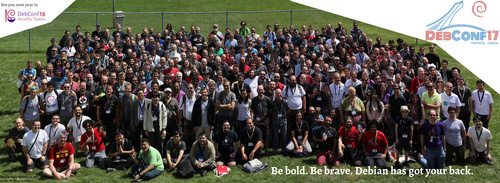
Here s a summary of the bugs against the Debian Policy Manual. Please
consider getting involved, whether or not you re an existing
contributor.
Consensus has been reached and help is needed to write a patch
#172436 BROWSER and sensible-browser standardization
#273093 document interactions of multiple clashing package diversions
#299007 Transitioning perms of /usr/local
#314808 Web applications should use /usr/share/package, not /usr/share/doc/
#425523 Describe error unwind when unpacking a package fails
#452393 Clarify difference between required and important priorities
#476810 Please clarify 12.5, Copyright information
#484673 file permissions for files potentially including credential informa
#491318 init scripts should support start/stop/restart/force-reload - why
#556015 Clarify requirements for linked doc directories
#568313 Suggestion: forbid the use of dpkg-statoverride when uid and gid ar
#578597 Recommend usage of dpkg-buildflags to initialize CFLAGS and al.
#582109 document triggers where appropriate
#587991 perl-policy: /etc/perl missing from Module Path
#592610 Clarify when Conflicts + Replaces et al are appropriate
#613046 please update example in 4.9.1 (debian/rules and DEB_BUILD_OPTIONS)
#614807 Please document autobuilder-imposed build-dependency alternative re
#628515 recommending verbose build logs
#664257 document Architecture name definitions
#682347 mark editor virtual package name as obsolete
#685506 copyright-format: new Files-Excluded field
#685746 debian-policy Consider clarifying the use of recommends
#688251 Built-Using description too aggressive
#749826 [multiarch] please document the use of Multi-Arch field in debian/c
#757760 please document build profiles
#759316 Document the use of /etc/default for cron jobs
#761219 document versioned Provides
#767839 Linking documentation of arch:any package to arch:all
#770440 policy should mention systemd timers
#773557 Avoid unsafe RPATH/RUNPATH
#780725 PATH used for building is not specified
#793499 The Installed-Size algorithm is out-of-date
#810381 Update wording of 5.6.26 VCS-* fields to recommend encryption
#823256 Update maintscript arguments with dpkg >= 1.18.5
#833401 virtual packages: dbus-session-bus, dbus-default-session-bus
#835451 Building as root should be discouraged
#838777 Policy 11.8.4 for x-window-manager needs update for freedesktop menus
#845715 Please document that packages are not allowed to write outside thei
#853779 Clarify requirements about update-rc.d and invoke-rc.d usage in mai
#874019 Note that the -e argument to x-terminal-emulator works like
#874206 allow a trailing comma in package relationship fields
Wording proposed, awaiting review from anyone and/or seconds by DDs
#515856 remove get-orig-source
#542288 Versions for native packages, NMU s, and binary only uploads
#582109 document triggers where appropriate
#610083 Remove requirement to document upstream source location in debian/c
#645696 [copyright-format] clearer definitions and more consistent License:
#649530 [copyright-format] clearer definitions and more consistent License:
#662998 stripping static libraries
#682347 mark editor virtual package name as obsolete
#683222 say explicitly that debian/changelog is required in source packages
#688251 Built-Using description too aggressive
#737796 copyright-format: support Files: paragraph with both abbreviated na
#756835 Extension of the syntax of the Packages-List field.
#786470 [copyright-format] Add an optional License-Grant field
#810381 Update wording of 5.6.26 VCS-* fields to recommend encryption
#835451 Building as root should be discouraged
#845255 Include best practices for packaging database applications
#850729 Documenting special version number suffixes
#874090 Clarify wording of some passages
#874095 copyright-format: Use the synopsis term established in the de
Merged for the next release
#661928 recipe for determining shlib package name
#679751 please clarify package account and home directory location in policy
#683222 say explicitly that debian/changelog is required in source packages
#870915 [5.6.30] Testsuite: There are much more defined values
#872893 Chapters, sections, appendices and numbering
#872895 Include multi-page HTML in package
#872896 An html.tar.gz has leaked into the .deb?
#872900 Very generic info file name
#872950 Too much indirection in info file menus
#873819 upgrading-checklist.txt: typo pgpsignurlmangle in section 4.11 of V
#874411 missing line breaks in summary of ways maintainers scripts are call
 Something I ve found myself doing as the pandemic rolls on is picking
out and (re-)reading through sections of the GNU Emacs
manual and the
GNU Emacs Lisp reference
manual. This
has got me (too) interested in some of the recent history of Emacs
development, and I did some digging into archives of emacs-devel from
2008 (15M
mbox) regarding the change to turn Transient Mark mode on by default
and set
Something I ve found myself doing as the pandemic rolls on is picking
out and (re-)reading through sections of the GNU Emacs
manual and the
GNU Emacs Lisp reference
manual. This
has got me (too) interested in some of the recent history of Emacs
development, and I did some digging into archives of emacs-devel from
2008 (15M
mbox) regarding the change to turn Transient Mark mode on by default
and set 
